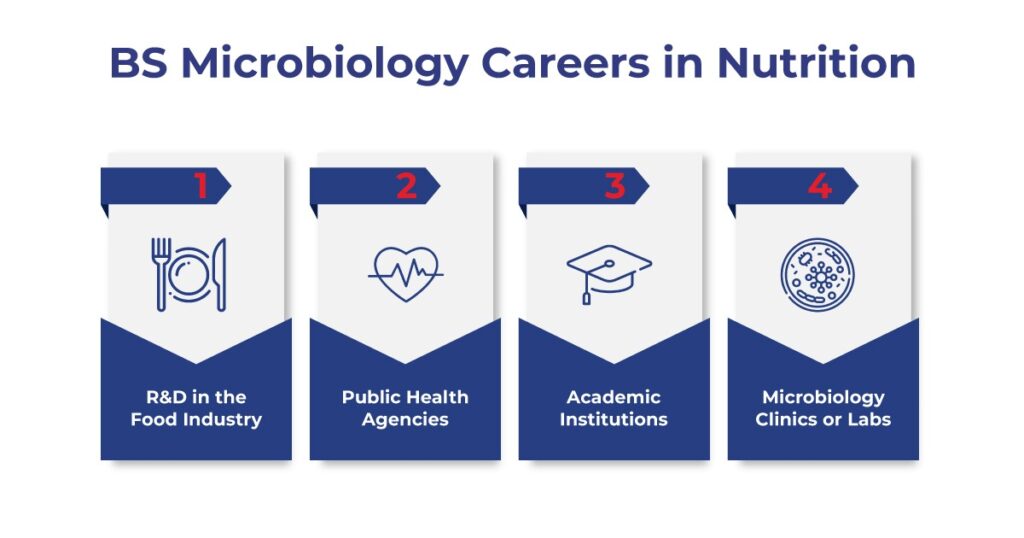Choosing the right educational path is compulsory in shaping your future career. In the current setting, many students want to follow nutrition and dietetics. However, one fascinating field that often goes hand-in-hand with nutrition is microbiology. Microbiology-study of microscopic organisms plays a significant role in understanding the complex relationship between our bodies and the food we consume. In this blog post, we will explore why pursuing a Bachelor of Science (BS) in Microbiology can be your gateway to a rewarding career in nutrition. You can consider this post to make a wise decision with respect to your career. The admissions process is underway at Lahore-UBAS.
Difference Between Microbiology and Nutrition & Dietetics
Microbiology is a different field in comparison to nutrition and dietetics. The difference lies between the courses and content of both sub-fields of applied sciences. BS Microbiology falls under applied sciences, whereas BS nutrition and dietetics are classified under health sciences. Yet, there are some overlapping content details in both of them. Check out the curriculums here.
Because of these common courses, there is a major possibility for any such students who dream of making a career in nutrition to do so with a degree in microbiology. Hence, you can say a BS Microbiology is also ideal for a career in nutrition sciences.
Therefore, if you are curious about BS Microbiology, you can read the details here.
Scope of BS Microbiology for Nutrition Sciences

BS Degree in Both Specialisations
Whether you choose BS Microbiology or BS Nutrition and Dietetics, you can study a four-year degree programme with the best facilities. At Lahore-UBAS, we offer the authorised and regularly updated curriculum for study purposes.
In addition, other on-campus facilities are also applicable to the students of BS Microbiology. As well as to other disciplines.
Understanding the Microbiome in BS Microbiology
The human microbiome is an intricate community of microorganisms living within our bodies, primarily in the gut. These microorganisms play a crucial role in digestion, metabolism, and overall health. A BS in Microbiology equips you with the knowledge and skills to study and manipulate these microbial communities. By understanding how different bacteria impact digestion and nutrient absorption, you can make informed recommendations for personalised nutrition plans. That’s where nutrition and dietetics come into play from BS Microbiology.
BS Microbiology Can Help to Handle Food Processing
Microbes actively participate in the creation of nutrients; they are not only motionless components of our bodies. For example, specific gut bacteria oversee the creation of important vitamins like vitamins K and B. A foundation in microbiology enables you to delve into the complex mechanics underlying these processes, resulting in improvements in the production and supplementation of nutrient-rich foods.
Food Scientists with BS Microbiology Ensures Food Safety
Experts in identifying and controlling dangerous microbes in food include microbiologists. This skill set is priceless in the food sector, where maintaining the edible goods’ safety and quality is of the utmost importance. You can contribute to the development of safer and healthier food items, supporting greater public health by fusing nutritional knowledge with microbiological expertise.
BS Microbiology Means Research Opportunities
Microbiologists are at the forefront of scientific research, continually exploring the links between microorganisms and human health. With a BS in Microbiology, you can engage in innovative research that advances our understanding of how the microbiome influences nutrition and metabolism. This research can lead to groundbreaking discoveries and innovations in the field of nutrition.
Diversified Career Combination: Nutrition and Microbiology
A BS in Microbiology provides a versatile foundation that opens doors to various career paths. You can work in research and development for food companies, public health agencies, or academic institutions. Alternatively, you can become a clinical microbiologist, focusing on diagnosing and treating infectious diseases with a strong understanding of how nutrition impacts immune health.
Bridging the Gap Between Disciplines
In recent years, there has been a growing realization of the interplay between microbiology and nutrition. Many health professionals seek individuals to bridge the gap between these two disciplines. By pursuing a BS in Microbiology, you position yourself as a valuable asset in multidisciplinary teams, collaborating with nutritionists and healthcare providers to deliver holistic patient care.
Want to Apply for BS Microbiology?
Lahore-UBAS is accepting applications for BS Microbiology for fall admissions 2023. If you have an interest in the field, it is better to apply before the last seat gets filled. Quick decisions are always the best to make when there is enough time. An online admission portal is available for the process of application.
Reminder
A Bachelor of Science in Microbiology can be your gateway to a rewarding and impactful career in nutrition. With a solid foundation in microbiology, you will be well-prepared to explore the complex relationship between the human microbiome (collection of microbes) and nutrition, contribute to food safety and quality, conduct groundbreaking research, and become a valuable interdisciplinary team member. This educational path empowers you to make a difference in people’s lives and offers diverse career opportunities in a rapidly evolving field. So, if you are passionate about nutrition and intrigued by the microbial world, consider pursuing a BS in Microbiology – it might just be the key to unlocking your dream career in nutrition.


